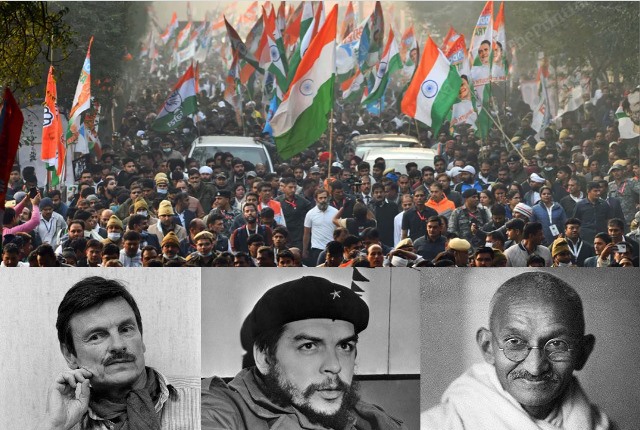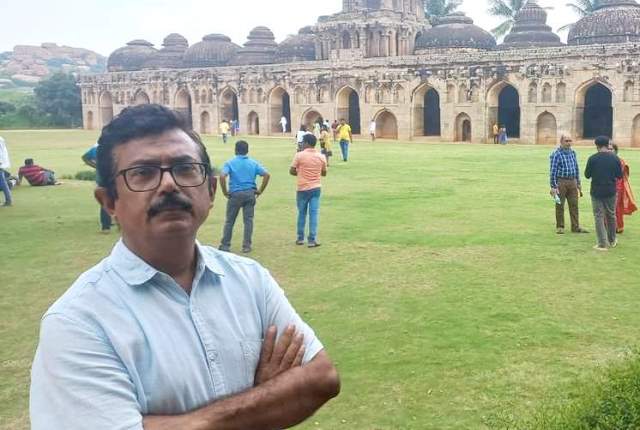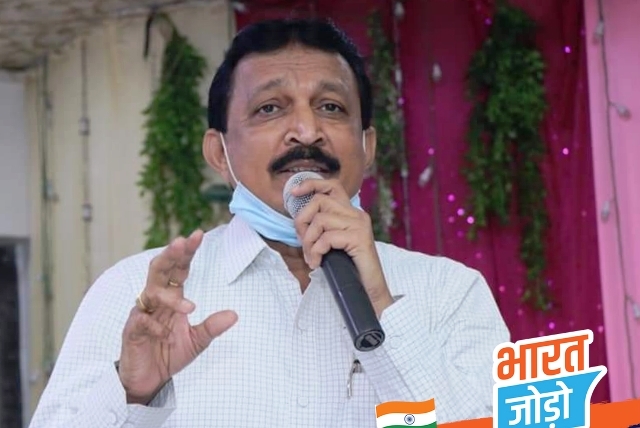If life could be totally predictable, inevitable and mechanical, then it would be difficult to live for even one moment. If everything could be ‘manufactured consent’, as Noam Chomsky wrote, totally controlled and pre-determined, then this Orwellian realm of everyday existentialism, hate politics and fake news, would be, indeed, suffocating and oppressive.
Yes, it is.
And, yet, it is not!
If thought and emotion do not precede action, and if theory and praxis have no meaningful synthesis, then it would be a jarring symphony we would be playing all our life. If collective and individual suffering is dumped and degraded in the pursuit of crass, selfish, profit and ambition, then there can be no love for the nation, or humanity. All the books we have read, our youthful idealism, our dream for a better world — that is of no use anymore.
There can be wealth, fame, private property, cushy jobs, happy families and comfort zones in our atomized, protected, sanitized structures of daily life. But, there would be no music, nor dance, or song. There would be no authentic friendships or spiritual journeys into the unknown, no contradictions or imperfections, no vulnerabilities and fragilities, no compassion and passion. Knowledge will never truly liberate. Work and love will have no play or joy. All freedom and happiness would be fake!
This is because despite the typical patterns of predictability, despite the black holes which often trap our inner souls into a doomed dungeon, there are always signs and symbols of magical optimism which emerge from nowhere, outside the manifest code, beyond the truth of absolute knowledge. Walter Benjamin would call it close reading beneath the surface, rediscovering the nuanced, the unstated, the mystical, the intangible. Ivan Illich would say that what is of utmost importance is unlearning and learning – perhaps unlearning is more crucial then learning.
There could be music in an empty sheet of paper, who knows? Akira Kurosawa would jot down all over the blank sheet, on the sides, in the corners, for hours labouring on his notes, like the old Postcards we wrote before quick emails destroyed letter-writing. Despite that, he was unable to find the central thesis of his disjointed masterpiece.
Andrei Tarkovsky would make magnificent and mystical cinema, often, with his father’s poetry in the backdrop in Russian, and you could see actually the grass move with the wind and touch the beautiful woman’s feet in ‘Mirror’; she, sitting on a fence, forlorn and solitary. Like a message of deep love from a man going away into the far-distance.
And, yet, Tarkovsky would know that cinema is so painstakingly technological, meticulously mechanical; and, yet, he would say, that poetry has a different reason to exist for different human beings, because it could be a ‘way of life’, like his cinema in exile from totalitarian Soviet Russia.
There was indeed music on an A-4 size of paper recently, which was a blank sheet, held by young girls and boys in China, seeking dissent and democracy, in an absolute dictatorship, camouflaged as “Communist”, but, basically, a Repressive State Apparatus. They have recently witnessed how the students’ movement in Hongkong, the media, and civil society, were so brutally crushed by the ‘Communist Establishment’ in Hongkong. So much so, a statue as a tribute to those students massacred in Tiananmen Square in June, 1984, too, was crushed in Hong Kong. Indeed, why are dictators so afraid of memories?
The blank A-4 sheets held by youngsters in China only said what they wanted to speak out aloud, and could never speak. This too was a sign that all is not lost, even in a one-dimensional dictatorship led by a man with a half-twisted smile who has assumed that he too is immortal – like all dictators in the history of the world!
Remember the Dandi March? Remember Richard Attenborough’s epic film on Gandhi? Remember that reporter trying to send a story of the march on the wire? Remember how the police broke the heads of each and every Satyagrahi, coming one by one, waiting for the blow, refusing to succumb?
ALSO READ: ‘Bharat Jodo Is A Healing Touch For Wounded Nation’
There was no big monopoly media those days under the repressive, cold-blooded plunderers of the brutal British empire. There was no internet or social media or television. Despite that the march against the Salt Tax was ‘breaking news’ inside every courtyard of distant Indian homes! How did that happen?
And people who had little or no courage were burning firangi clothes inside their homes, because Gandhi gave them a chance to join the freedom struggle, even with their constraints. And even while he built a committed cadre and political leadership which would be ready to sacrifice everything for the freedom of the country, he knew that those who have little courage today can show exemplary bravery tomorrow, perhaps, day after tomorrow! All human beings, thus, deserve a chance. Those who are cowards today can become the bravest tomorrow.
This is because history is unpredictable, like human nature, and history shapes human nature, since it is the being which determines the consciousness, and not vice versa, as Karl Marx wrote. He also wrote, that if you can’t love, and if your love cannot create love, then you are an “unobjective being, an impotent person”.
It is like Che Guevara’s famous poster which says that if you can’t love, you can never change the world. This is because if there is no synthesis between the romantic and the radical, then the radical is dry, barren, rootless, and narcissistic, without sensuality or sensitivity, almost inhuman, outside humanity.
From Kashmir to Kanyakumari. Almost 25 kilometers every day, with a dedicated band of ‘walkers’, criss-crossing the countryside, small towns and cities, holding hands and fingers, walking with youngsters, old and young, uninhibited and with effortless love and affection, hugging everyone, carrying little kids on the shoulders, running suddenly in a spurt of energy and ecstasy, watching street theatre by idealistic youngsters on the wayside, discussing all that is important and seemingly unimportant, from sustainable environment to the logic of tapasaya, to the nostalgia of old Italian scooters, walking, nevertheless, from very early morning to twilight, each day, with tens of thousands of Indians.
Who are these tens of thousands of Indians? And what is the message?
In the market of hate, a daily public spectacle is selling unchained, unselfish, unbridled love — unleashed! No wonder, despite the stooge media — doing nothing but Hindu-Muslim hate polarizations — blocking it, or the trolls trolling it with crudity unsurpassed, the message found a sacred space in the solitary book shelf of every heart, even, perhaps, those hearts who hate day and night, and never get tired of it.
Let it be stated, finally and frankly, that the Bharat Jodo Yatra, led by a young, bearded Rahul Gandhi, with infinite stamina, in a faded white T-shirt, has struck a chord across millions of hearts in India! And this is happening when we all thought hate has won the final victory, and that rapists and murderers would forever become free in Gujarat, that fear is the only Orwellian key in our daily life, and that we know so well how so many innocent, peaceful protesters, including young and brilliant scholars, most of them Muslims who believe in the Indian Constitution, have been languishing in prisons.
The love has spread in the dingy dungeons of hate, though the frustrated faces of hate remain unchanged. The love has touched the people beyond class, caste, religion and identity, and it is still a lovely ghost who walks the streets. They just cannot stop it.
“Rahul Gandhi, he is in your mind,” he told reporters in his umpteenth press conference, in a ‘democracy’ where the current PM has had — not ‘one’ press conference. The meaning is clear as a pristine and ever-flowing river, like the long march. This yatra is different – it is another phase of ‘national enlightenment’. Don’t talk of individuals. They are mere signs and of history.
This contemporary history must change. This world must change. This India must change. Because, as the slogan goes: Nafrat Choro, Bharat Jodo…
Happy New Year Dear Readers, Friends and Strangers. May love, friendship and hope float in your warm and cosy homes.




